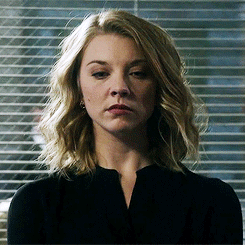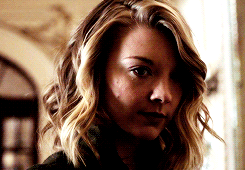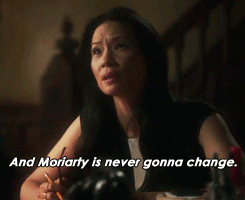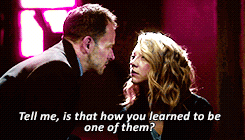***This post contains spoilers for the most recent episode of Elementary, “The Diabolical Kind.”***

Thursday’s Elementary did something truly remarkable: It put Joan Watson and Jamie Moriarty in the same room just to let the audience watch the magic unfold. In fact, Natalie Dormer was a game-changer in this episode, reshaping the way we as viewers relate to her, Sherlock, and Joan, all in a matter of 43 minutes.
The voice of Moriarty, a man named Devon Gaspar, kidnaps a young girl named Kayden Fuller for a ransom. Sherlock recognizes his voice and makes the connection to Moriarty herself. In exchange for her help, Moriarty negotiates her limited freedom: She shows up at the 11th Precinct with a posse of bodyguards in tow. Sherlock is insistent for most of the episode that Moriarty is behind this, but the true reason comes out toward the end: Kayden is Moriarty’s biological daughter, and her kidnapping was actually a threat to Moriarty.

Surprisingly, it’s Joan who indirectly picks up on this first. When everyone is gathered in Captain Gregson’s office to listen to Gaspar make his threats, Joan notices the expression on Moriarty’s face when Gaspar puts Kayden on the phone. “I’ve seen that look before. I’ve been on the receiving end. It looked like she wanted to kill the guy.” Sherlock brushes it off as he’s busy rifling through newspapers, but it’s funny that Joan continues to have a better read on Moriarty than even Sherlock.
Her scene with Moriarty in the Fuller home was more indication of that. It was two minutes of two compelling female characters duking it out with only their words. Moriarty tells Joan that she’s been thinking about her a lot, which doesn’t surprise Joan, but Moriarty goes on to admit that she misread Joan initially. She tries to puzzle Joan out further, stating that Joan’s partnership with Sherlock stems from her desire to be acknowledged by “a superior mind,” but Joan surprises Moriarty once more: “Actually, the partnership was his idea.”

Moriarty visibly reacts to this, and Joan correctly surmises that it bothers her. Joan showed perceptive savviness by even mentioning that it was Sherlock’s idea: Moriarty was trying to insult her, and instead of rising to it or laughing it off (as Joan often does when Sherlock subtly insults her on accident) Watson instead feinted and hit Moriarty where it hurt.
“I confess to not understanding it, but I’m drawn to things I don’t understand. Same as Sherlock. Once I’ve figured you out, I’ll move on. Same as Sherlock.”
Joan asks if that’s why Moriarty’s been writing to him: because she can’t understand him and is trying to figure him out. Moriarty avoids the question by asking what Joan thinks.
“You think you’re in love with him, only you can’t be sure, because as much as you claim to know about the world, love is something you don’t quite get.”
“You’d be surprised what I’d do for love.”
“Nothing crazy people do surprises me.”
Joan doesn’t notice, but Moriarty is holding a picture of Kayden in her hands and she absently strokes it when Joan says that Moriarty doesn’t understand love. She further misinterprets Moriarty’s statement about what she’d do for love as something to do with Sherlock, when it’s not–she’s vowing to get her daughter back to safety, but Joan doesn’t know about that yet, and she doesn’t yet have the experience to be able to deduce something that farfetched. (That’s likely why the writers don’t have Sherlock in this scene, or why they had Moriarty make such a statement when he’s not around. That’s something he would normally pick up on.)
“I write to Sherlock because he’s the only person on the planet I can really talk to. He writes to me because I’m the only one he can talk to. The only one he can ever truly relate to. If you don’t understand that, you will someday. I promise.”
Moriarty gives Joan that cold, murderous stare she’s always giving her, but Joan just rolls her eyes, unafraid as ever. Moriarty talks to Joan that way because she wants to deconstruct her, figure her out, complete the puzzle. She’s trapped in fascination, and she said herself that she won’t be able to “move on” until she’s figured it out. Joan, on her side, recognizes all of the barbs from Moriarty because she’s spent so many years as a sober companion, and no one is more biting than someone in the throes of addiction recovery. This is barely even a case of two women fighting over a man: Sherlock is at the center of it, sure, but this is more about Moriarty wishing to figure out someone who is more enigmatic than anyone she’s ever met, and about Joan looking out for herself as well as someone she cares about. I will be shocked and saddened if this scene doesn’t win some sort of award, it was one of the more brilliant things I’ve ever seen on television.


Almost as brilliant, and infinitely more nuanced, is the scene Moriarty and Sherlock have at the end of the episode, after she’s killed the kidnappers and sent her daughter back to safety. She hints at having a mentor (perhaps another big baddie on the horizon?) and admits that “In this case, I had the added benefit of assistance from the keenest mind I’ve ever met.” Sherlock barely smiles at this, like he still craves her approval, or perhaps that he simply feels the same way about her: she’s the keenest mind he’s ever met. “All’s well that ends well, right?”
Sherlock asks why she’s turning herself in, why she didn’t run, and she scoffs at the idea of being a fugitive. “The world’s corruption runs deeper than even you know. No need to skulk about, I’ll be a free woman soon enough.” She goes on to add, “Your letters have meant a great deal to me. I find them influencing my decisions in the most surprising ways.”
He points out that she could’ve killed her bodyguard, and she admits that she considered how upset Sherlock would’ve been if she had done that. In a way, this makes Sherlock the Joan to Moriarty’s Sherlock. He said in the season 1 finale that he didn’t pocket some Vicodin because he knew how disappointed Watson would be in him; in fact, he said that was the only thing that kept him from taking the drugs. If this is a rare moment of vulnerability and honesty on Moriarty’s part, then Moriarty feels more or less the same way about Sherlock as he does about Joan:
“Tell me, is that how you learned to be one of them? By learning to care how your actions seem in the eyes of another?”
“I’m not sure I am one of them.”


And why shouldn’t that be a real moment between them? She didn’t kill someone that was, in her mind, completely expendable. Maybe she really can change. Maybe she’s manipulating him. Either way, it’s telling that Joan wasn’t in this scene.
After Moriarty is taken away for medical assistance, Sherlock and Joan share a long look that belies their partnership. Sherlock now has an even deeper understanding of Joan in the wake of his conversation with Moriarty, even after he admitted his deepest fear: Maybe he’s not one of “them” after all. But the truth is, as long as he has Joan, he’ll be as close as he can to “them” as possible. It’s probably my favorite shot of the whole episode, odd lighting and all.

He keeps Moriarty’s letters, storing them once more in his bee box as the song playing in the background says, “So collect your scars and wear ‘em well, your blood’s as good an ink as any.”
Next week: Things look a little more lighthearted, and it looks like we get a substantial amount of Bell back! (In this episode, he was only shown in a montage of Sherlock’s voiceover in a letter to Moriarty. Bell was at the gun range, trying to practice target shooting, but his hand shook too badly to aim the gun. He looks broken as Sherlock says, “If I truly had the purity of all my convictions, I wouldn’t regret so many of the things I’ve done.”)









